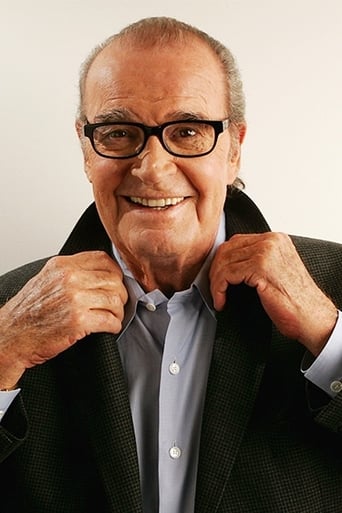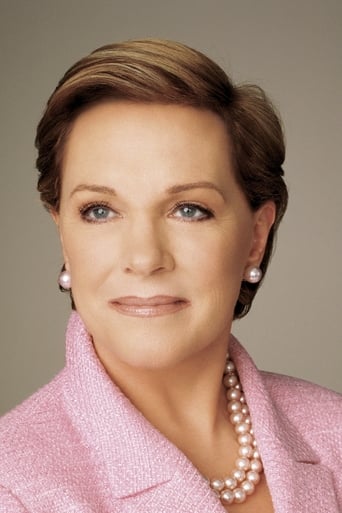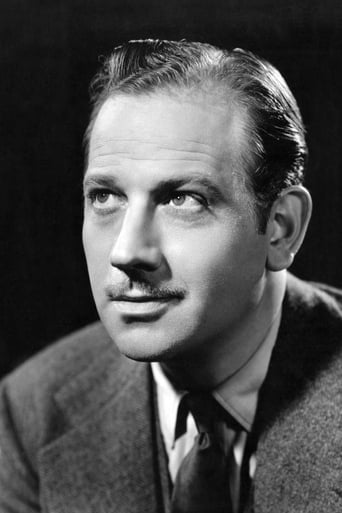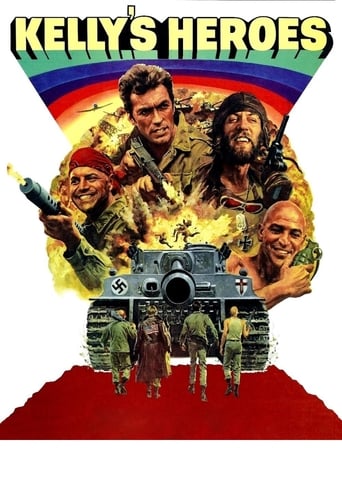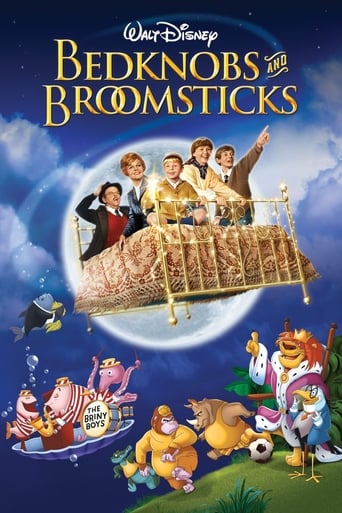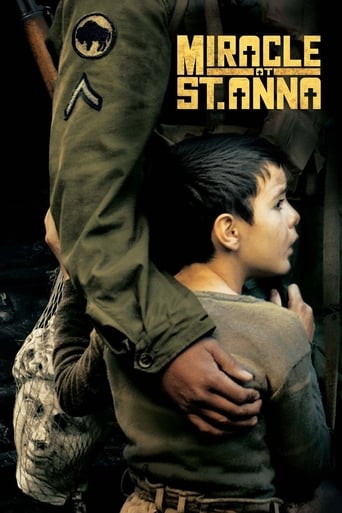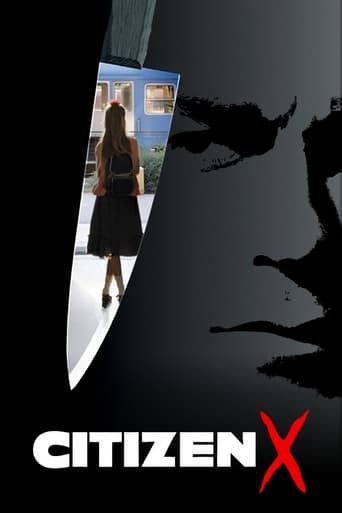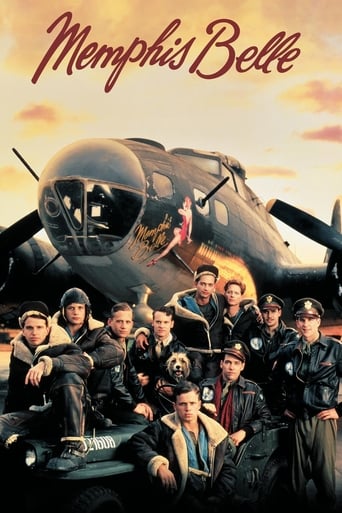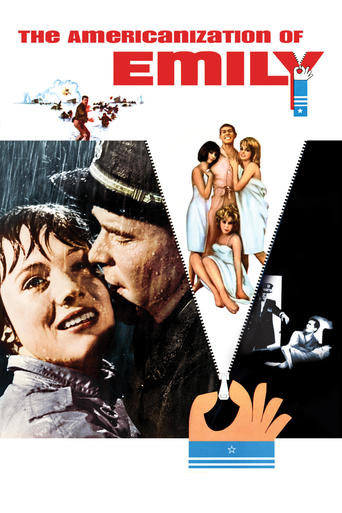
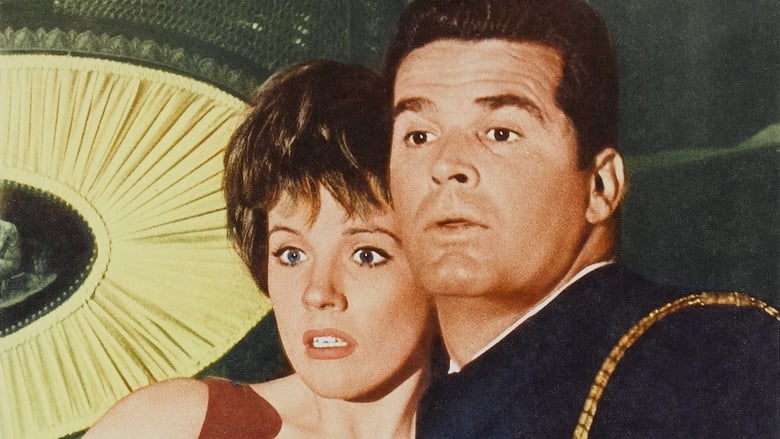
The Americanization of Emily (1964)
American sailor Charlie Madison falls for a pretty Englishwoman while trying to avoid a senseless and dangerous D-Day mission concocted by a deranged admiral.
Watch Trailer
Cast
Similar titles
Reviews
I think this is a new genre that they're all sort of working their way through it and haven't got all the kinks worked out yet but it's a genre that works for me.
It's no definitive masterpiece but it's damn close.
Better Late Then Never
The film never slows down or bores, plunging from one harrowing sequence to the next.
Not the typical American romantic comedy in the WWII, here are dense and sharp dialogue, with sarcastic characters ridiculing the noble art of war and argue in favor of cowardice as a form of pacifism (something really curious) and that makes the difference with others films of the same kind and gives that movie a special value, especially in the first half... but, unfortunately... as the footage progresses it begins to drift, get lost, becomes chaotic in the worst sense (kind a screwball comedy) and repeated ad nausea, with characters talking and screaming nonstop, to say the same thing over and over again, until the very last minute, for nearly two hours, making an unnecessarily long and heavy movie. A missed opportunity to do a really ironic and brilliant film.
Released the same year as Dr. Strangelove, Seven Days in May, Fail Safe and The Best Man, The Americanization of Emily must have seemed dull and conventional even in its day. Arthur Hiller who directed Love Story, Silver Streak, Making Love and The In-Laws is no Kubrick or Frankenheimer; he's an unimaginative, pedestrian director who fared better with The Hospital(1971)also scripted by Paddy Chayefsky which was funny and featured a spectacular performance from George C. Scott. Emily is seemingly endless, wavers in tone, and the two stars are dull together; their love scenes lack genuine passion. Garner is blank and Andrews' clipped speech leaves one chilled. A few interesting ideas and scenes are overwhelmed by a talky script and inert filmmaking. As a whole, the film doesn't compel or hold together.
Building up to D-Day, American Charlie Madison (James Garner) arrives in England on May 4, 1944. He is a "Dog-Robber" or a personal attendant of a general or an admiral keeping the highest ranked personnel happy. Emily Barham (Julie Andrews) is the driver given to the brash Madison and she's not very impress with the American at first. She had suffered great losses. Despite that, they fall for each other. His superior Adm. William Jessup (Melvyn Douglas) is going crazy trying to maintain the profile of the Navy. He comes up with a scheme to make the first dead man on Omaha beach to be a sailor and sends Charlie off to the pointless suicide mission.For this movie, it's the Paddy Chayefsky screenplay that is the most important. His lines are sizzling. James Garner eats up his rants. The 'cowardice as a virtue' speech has no parallels that I know of. His character is deeply complex. Julie Andrews is absolutely winning. The story doesn't portray the military in the best light.
Garner is Charlie Madison, who used to manage things for guests at a high-end hotel, getting them girls and booze, seeing to it that they were happy. In an excess of virtue, when the war begins he enlists as a private in the Marine Corps and discovers on Guadalcanal that he's afraid of dying. Very sensibly, he decides to get out of it. He calls an admiral, Douglas, who was one of his hotel clients and becomes a Lieutenant Commander in the Navy. His duty? See to it that the Admiral is satisfied in every material and spiritual respect. Garner gets to sport two and a half stripes and a gold fourragere.Garner is a proud coward. He meets and improbably romances Julie Andrews, who has lost a husband, a father, and a brother in the war. Boy, does Garner tell off Andrews and Andrews' grieving mother. "You wear your widow's weeds like a nun," he says. He presents a pretty good case for cowardice. What would happen if, instead of glorifying heroes, we glorified poltroons? No more war -- that's what would happen.Unfortunately for Garner, Admiral Douglas flips his wig and determines that there are political forces in Washington that are out to scrap the Navy in favor of the Air Force. As a public relations stunt, he arranges for Garner to be the first warrior to die on Omaha Beach. Douglas wants a movie of the dead body awash in the waves. Nations will build monuments to the U. S. Navy. There will be statues of Garner fighting his way ashore. Douglas will insist on a Tomb To The Unknown Sailor in Arlington.These are Big Issues. They're the kind that the screenwriter, Paddy Chayevsky, would increasingly be drawn to. He'd use the crazy leader idea in "Network." Come to think of it, the same year also saw the release of "Dr. Strangelove." Maybe crazy leaders was an idea whose time had come. Which brings up another important question. Is it about time for a remake? Garner manages to survive the D Day landings. There's an effective scene in which his lone figure freezes on a sandy beach that is exploding all around him. When he returns to England he's a changed man. The Navy is a little disappointed that he wasn't the first dead man, but at least he was the first man ashore. However, instead of accepting the ticker tape parade in New York, he's determined to tell the truth -- he was forced onto the beach by being deliberately fired on by his former pal, James Coburn. Thereby, he will ruin his career, the Navy's reputation, our thirst for heroes, and everything else. Julie Andrews is proud of him.I don't know that that moral calculus quite works out. Garner's cowardice is admirable except for the fact that, by vacating his place in combat, he's causing someone else to take his place. It isn't as if war were dependent on personality. It's a systemic disease. From the point of view of natural selection, war should eventually eliminate itself, in that the testosterone-ridden should eliminate themselves, leaving behind only psychopaths like Garner and schizophrenics. But thermonuclear weapons put an end to that. Now, in another world war, everybody dies -- Hawks and Peaceniks alike.Morality and biology aside, there are two problems with the flick. One is that Garner, for all his appealing cynicism and candor, is really pretty cruel. When he calls Andrews' mother -- who lost so many relatives -- a phony because she's playing the role of the widow, he's lost touch with the nature of grief itself. Grieving is a social process, true, and mourning is ritualized. (See Paul Rosenblatt's work.) But that doesn't mean grieving isn't prompted by a genuine emotion. We mourn the loss of someone we love, and the role we play is just society's way of telling us how to handle our distress. Otherwise, we'd have to make it all up as we went along. In sum, Garner's character is unlikable from beginning to end, although the writer seems to admire his no-BS attitude.Second problem, not on the same level: The ending seems slapdash, thrown together. All of a sudden he's dashing around on Omaha Beach, frightened out of his wits. But James Coburn is only a few steps behind him, filming every tremor. And, okay, Garner is determined to tell "The Truth." But knowing him as we do, we may be permitted to doubt that he will. When he sits down and thinks things over, he'll probably come to accept that ticker tape parade in New York. Nothing he's said or done previously has suggested that he won't.But the movie does stimulate some thoughts about heroism, almost despite Chayevsky's preaching about the subject. I feel absolutely certain that some PR people, somewhere, were very happy that among the Marines in that world-famous photo of the flag being raised on Mount Suribachi, there was an American Indian and a Navy corpsman. How about a tomb for the unknown dead of every one of the Armed Forces from every one of the forty-eight states -- a separate tomb for the past five wars America has fought in? (That's 1,200 tombs for unknown American warriors.) And why was Private Slovick executed for desertion -- because he wasn't hooked up with the right admiral? There's a thin line between the sublime and the ridiculous.
